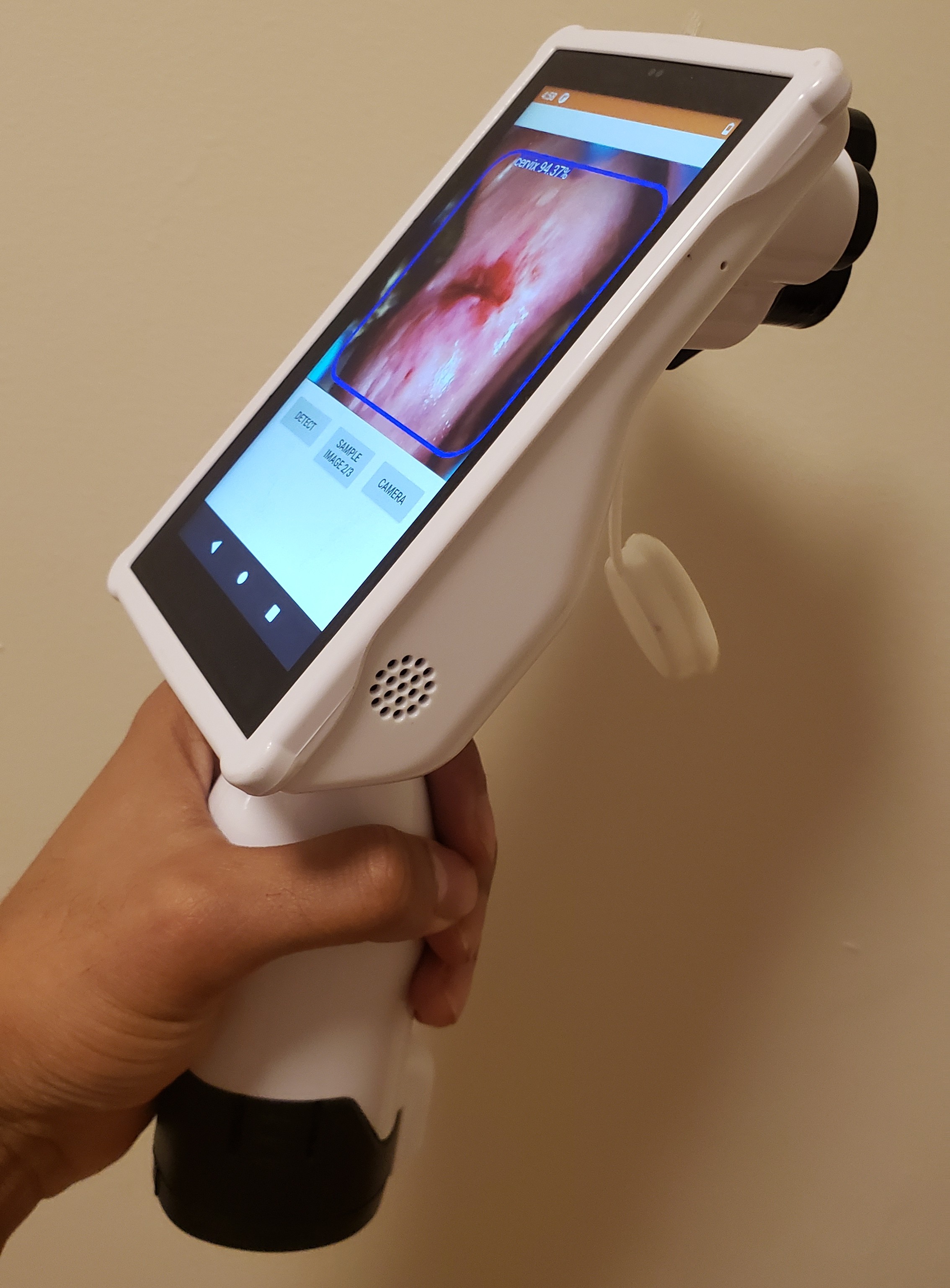Globally Deployed Cervical Cancer AIPublications
In this project, I led the AI arm of a global consortium (PAVE) to build the first generalizable AI-driven cervical cancer screening and treatment pipeline deployed in the field. Cervical cancer is the leading cause of cancer death (>90%) in women in many low-income countries, yet entirely preventable if caught early. Using a custom colposcope-thermocoagulator, my pipeline has already been used to screen 25,000+ women across 9 countries, including Brazil, Cambodia, Dominican Republic, El Salvador, Eswatini, Honduras, Malawi, Nigeria, and Tanzania, bringing lifesaving early detection to populations previously without access. For women who would otherwise wait months or years for care, this means answers and treatment in a single visit. Publications generated from this work are highlighted here as well as below, with seminal work encapsulating the multi-stage, comprehensive development of the diagnostic classifier, external validation and generalizability assessment across multiple devices and geographies, and the development/validation of the quality classifier. Our study design is highlighted in this paper, while preliminary results of screening using my pipeline is highlighted here. This work has also received national coverage in an NCI.gov feature
Papers
Generalizable deep neural networks for image quality classification of cervical images.
Ahmed SR,
Befano B,
Egemen D,
et al.
Nature Sci Rep. 2025 Feb 21;15(1):6312.
Assessing generalizability of an AI-based visual test for cervical cancer screening.
Ahmed SR,
Egemen D,
Befano B,
et al.
PLOS Digital Health. 2024 Oct 2;3(10):e0000364
Reproducible and clinically translatable deep neural networks for cervical screening.
Ahmed SR,
Befano B,
Lemay A et al.
Nature Sci Rep. 2023 Dec 8;13(1):21772
Use of risk-based cervical screening programs in resource-limited settings.
Perkins RB,
Smith DL,
...,
Ahmed SR et al.
Cancer Epidemiol. 2023 Jun;84:102369.
AI-based image analysis in clinical testing: lessons from cervical cancer screening.
Egemen D,
Perkins R,
...,
Ahmed SR,
et al.
J Natl Cancer Inst. 2023 Sep 27:djad202.
Design of the HPV-Automated Visual Evaluation (PAVE) Study: Validating a Novel Cervical Screening Strategy.
de Sanjose S,
Perkins R,
...,
Ahmed SR,
et al.
eLife (2023). 12:RP91469
Conformal prediction and Monte Carlo inference for addressing uncertainty in cervical cancer screening
Clark C,
Kinder S,
...,
Ahmed SR,
et al.
In: Sudre, C.H., Mehta, R., Ouyang, C., Qin, C., Rakic, M., Wells, W.M. (eds) Uncertainty for Safe Utilization of Machine Learning in Medical Imaging. UNSURE 2024 in conjunction with MICCAI 2024. Lecture Notes in Computer Science, vol 15167. Springer, Cham.
Applying self-supervision and conformal prediction for cervical cancer screening.
Clark C,
Kinder S,
…,
Ahmed SR,
et al.
submitted, under review.
Design and multi-rater evaluation of a cervical visual treatability classifier
Ahmed SR,
Jeronimo J,
Hansen N,
et al.
in preparation for submission.
Presentations and Symposia
Implications for squamocolumnar junction visibility on the performance of Automated Visual Evaluation algorithm for cervical cancer screening
Desai K,
Befano B,
Ahmed SR,
et al.
International Papillomavirus Conference (IPVC) 2024
Assessing cervical image quality for an AI-based Automated Visual Evaluation (AVE) algorithm in the PAVE strategy.
Desai K,
Morin J,
Ahmed SR,
et al.
International Papillomavirus Conference (IPVC) 2024
Deep learning-based cervical cancer visual evaluation test: designing the test result as 2-class or 3-class.
Egemen D,
Befano B,
Rodriguez AC,
Ahmed SR,
et al.
International Papillomavirus Conference (IPVC) 2023



